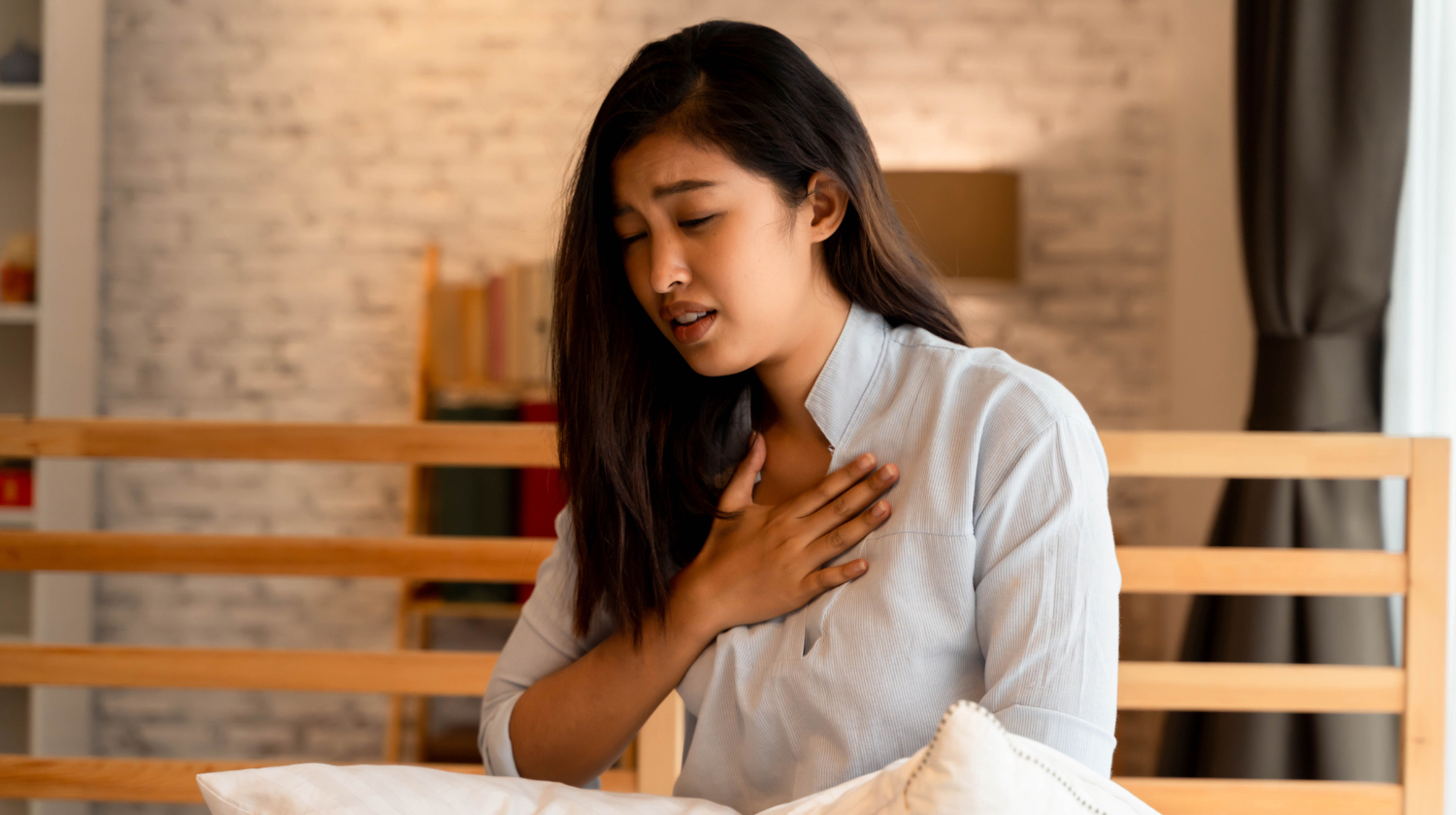How To Tell If Shortness Of Breath Is From Anxiety 2024

Shortness of breath, or dyspnea is “the uncomfortable sensation of not getting enough air to breathe,” which you may feel when physically active or even at rest. Various medical conditions can cause dyspnea to come more often than normal, from respiratory disorders such as chronic obstructive pulmonary disease to cardiovascular diseases and other forms of heart failure.
Shortness of breath[1] can also be caused by anxiety. As a result of a heightened response or hyperactive sympathetic nervous system, changes in heart rate can cause the body to require more oxygen than usual, leading to the feeling of dyspnea. Fortunately, various anxiety treatments are available in these cases to help reduce that feeling.
However, dyspnea from anxiety can seem very similar to that from medical disorders. Thus, it is important to know how to tell if shortness of breath is from anxiety rather than from a medical condition.
How Can You Identify If Shortness Of Breath Is From Anxiety?
It can be challenging to determine if shortness of breath is caused by anxiety or something else. Still, anxiety is likely the culprit if you also experience symptoms like a tight chest, heart palpitations, and nausea. Other possible reasons for shortness of breath could be a respiratory infection, asthma, a heart attack, or obesity.
Symptoms Of Anxiety-Related Shortness Of Breath
Shortness of breath is one of the most common anxiety symptoms, a sign of an incoming or current anxiety attack or intense stress response. Other physical symptoms that can occur alongside anxiety-related shortness of breath include (but are not limited to) the following:
- The feeling of tightness in your chest.
- Heart palpitations.
- Nausea.
- Feeling faint or lightheaded.
- Increased restlessness or irritability.
- Muscle tension.
What Causes Shortness Of Breath Aside From Anxiety?
There is a strong association between the physical symptoms related to anxiety/stress responses and respiratory symptoms. As a result, those who have been diagnosed with an anxiety disorder (including a panic disorder) or clinical depression may experience them more frequently than others.
Shortness of breath is linked to changes in heart rate resulting from a released burst of hormones that occurs as part of the fight or flight response, the body’s natural response to stressful situations.[2] With this increase in heart rate, your body demands more oxygen to the point that it feels like you’re not getting enough air; this is where this sensation of shallow breathing comes from.
However, it is important to note that a change in heart rate can also stem from non-psychiatric causes, such as medical conditions, or simply overexertion, such as during exercise. Additionally, shortness of breath can lead to a reciprocal result with whatever is causing it, whether it be a psychiatric disorder or other health conditions such as COPD.
How To Stop Shortness Of Breath From Anxiety
Deep Breathing

One of the simplest ways to manage anxiety-related respiratory symptoms is to practice and focus on deep breathing. Diaphragmatic breathing is one breathing technique[3] in which you focus on breathing with your diaphragm to help decrease your breath rate and oxygen demand. Focusing on your breathing during meditation also works.
Of course, you can do several other breathing exercises anytime and anywhere.
Relaxation Techniques

The most effective way to combat stress is by simply relaxing and finding ways to facilitate the parasympathetic nervous system to help calm you down.
An example of this is a type of grounding technique in which you clench and unclench certain muscle groups, one at a time. You can also try visualization, replacing your anxious thoughts and images in your mind with more calming and relaxing ones. Meditation, yoga, and tai chi are also helpful in relaxing both your mind and body.
Distract Yourself From Stressors

Knowing the exact stressors leading to shortness of breath can be fairly easy, depending on the stressors. Some popular forms of distraction in psychiatry include listening to music or examining art (this is known as music and art therapy), writing, or even taking a brisk walk or jog. The main goal here is to focus on something other than whatever is stressing you out; the less you focus on the stressor, the faster it is to alleviate the anxiety-related dyspnea.
Psychotherapy

Talking to a therapist can help you work on the underlying cause of your dyspnea in more severe mental or emotional disturbance cases. By figuring out underlying stressors or creating stress management plans with a therapist, you can reduce the frequency and severity of these anxiety attacks.
If physically visiting a psychiatrist or therapist is not possible for any reason, another alternative that can work fairly well in managing symptoms of psychiatric disorders is the use of online therapy.
Other Causes Of Shortness Of Breath
If you ever experience dyspnea but think, “I can breathe, but I feel like it can’t be anxiety,” chances are it may be something else. Other than an anxiety response, other common physical symptoms of dyspnea result from overexertion during exercise, extreme temperature change, or even mild dehydration. Shortness of breath in these cases is a normal physiological response and will subside within a few hours maximum.
In more severe cases,[4] however, dyspnea can also be a symptom of another medical condition or respiratory abnormality instead of anxiety disorders or other psychiatric conditions. As a result, knowing how to tell if shortness of breath is from anxiety or heart problems is important; pay attention to both physical and psychological symptoms of your current health or ailments.
Respiratory Infection
Some acute respiratory illnesses such as bronchitis, pneumonia, or COVID can cause shortness of breath or difficulty breathing. If you suspect this is the case, consider visiting your healthcare provider for a diagnosis.
Asthma
If you or your family have a known history of asthma or any other obstructive respiratory conditions, that may likely be the cause. Asthma occurs due to constriction and/or inflammation of the airways that are associated with these respiratory disorders. An asthma attack can easily be confused with anxiety symptoms.
Heart Attack
Sudden shortness of breath unrelated to anxiety may be a sign of an incoming myocardial infarction, more commonly known as a heart attack. Likewise, underlying cardiovascular diseases may be the culprit. In this case, it is recommended to consult your physician. Chest pain is another important sign of an oncoming heart attack.
Obesity
Those with obesity[5] are more likely to experience shortness of breath as the extra fat around your neck or chest can affect your body’s breathing patterns. This is better known as obesity hypoventilation syndrome.
If you think this is most likely the case, consider consulting a healthcare professional to determine how to eliminate the excess fat.
When To Consult A Doctor
The ways listed above for relieving shortness of breath caused by anxiety only work short-term and in acute cases. If you constantly experience dyspnea but know for certain that it results from anxiety disorders, consider seeing a mental health professional to work through managing your stress or for long-term techniques in chronic cases. If you believe the main cause of your shortness of breath is something other than anxiety, consider seeing your physician instead.
Regardless of the cause, it is recommended that you seek medical attention if you experience any of the following severe symptoms alongside your shortness of breath, as they may be signs of something more serious, and you should seek medical attention immediately.
- Chest pain or pressure (different from chest tightness).
- Fainting.
- Breathing has become labored and much more difficult for no obvious reason.
- Pain that radiates down the left arm.
The Bottom Line
In most cases, experiencing shortness of breath is harmless, assuming it is acute. However, it can happen so frequently that it interferes with your daily life.
The first step is determining what is most likely leading to this feeling. This primarily relies on your knowledge, but it is sometimes better to get a second opinion from a healthcare professional to narrow down the cause. If it turns out that it results from psychological disorders, there are fortunately several ways to lessen the feeling and make breathing easier.
+ 5 sources
Health Canal avoids using tertiary references. We have strict sourcing guidelines and rely on peer-reviewed studies, academic researches from medical associations and institutions. To ensure the accuracy of articles in Health Canal, you can read more about the editorial process here
- Mayo Clinic. (2020). Trouble breathing. [online] Available at: https://www.mayoclinic.org/symptoms/shortness-of-breath/basics/definition/sym-20050890#:~:text=Shortness%20of%20breath%20%E2%80%94%20known%20medically,breath%20in%20a%20healthy%20person.
- Mayoclinic.org. (2021). Stress management In-Depth – Mayo Clinic. [online] Available at: https://www.mayoclinic.org/healthy-lifestyle/stress-management/in-depth/hlv-20049495?p=1#:~:text=When%20your%20brain%20perceives%20a,to%20a%20normal%2C%20relaxed%20state.
- Hamasaki, H. (2020). Effects of Diaphragmatic Breathing on Health: A Narrative Review. [online] 7(10), pp.65–65. doi:https://doi.org/10.3390/medicines7100065.
- Laviolette, L. and Pierantonio Laveneziana (2014). Dyspnoea: a multidimensional and multidisciplinary approach. [online] 43(6), pp.1750–1762. doi:https://doi.org/10.1183/09031936.00092613.
- NHLBI, NIH. (2022). Obesity Hypoventilation Syndrome. [online] Available at: https://www.nhlbi.nih.gov/health/obesity-hypoventilation-syndrome



